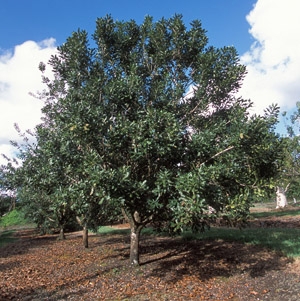
University of California
Cooperative Extension Ventura County
Healthful macadamias can enhance a California landscape

Macadamia nuts, native of Australia, have the highest amount of beneficial monounsaturated fats of any known nut. They also contain protein, potassium and minerals. A quarter cup serving is about 240 calories; for comparison, a quarter cup of almonds is about 100 calories less. Macadamia's unique texture and delicate flavor complement salads, baked goods and main dishes. The nut's oil has a long shelf life and may be used in salad dressing, for frying and as an ingredient in cosmetics.
UC Cooperative Extension horticulture advisor Gary Bender said macadamias make beautiful backyard trees, planted in the landscape or in large pots or tubs. They prefer fertile, well-drained soils and temperatures that range year-round from the 50s to the mid 70s, although established trees can withstand light frosts.
In their natural rain forest habitat, macadamia trees can grow to 60 feet in height. In California backyards, they will rarely exceed 20 to 30 feet, he said.
Gardeners who plant macadamia trees will have to be patient. Seed to tree takes 5 to 7 years; full production may take as long as 10 years. Once established, however, macadamia trees may continue bearing for over 100 years.
Although commercial macadamia production levels in California pale compared to Hawaii, where farmers harvest 54 million pounds of the nuts a year, macadamias have been grown in the Golden State continuously since 1879. The largest mainland industry is in San Diego County, where the ag commissioner reported growers harvested 192 tons of macadamia nuts from 128 acres of macadamia plantations in 2006, a crop worth $342,336.
UC Cooperative Extension in San Diego County and the California Macadamia Society will sponsor a field day for current and aspiring macadamia growers from 8:45 a.m. to 1:30 p.m. Nov. 6 at the farm of Garry and Patricia Prather, 6686 Via de la Reina, Bonsall, Calif. Registration is $20. At the field day, Bender will explain irrigation scheduling for macadamias. UC Integrated Pest Management advisor Cheryl Wilen will discuss chemical and organic weed control in macadamia production.
More information about the field day is on the San Diego County UCCE calendar. A registration form is on the Gold Crown Macadamia Association website.
